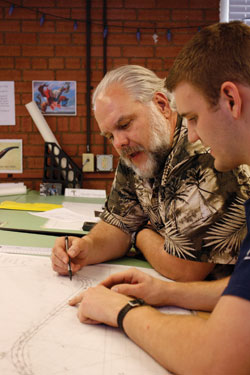In "Klein'd" to Care
Story and Photo by Jake Grinnell
In a cluttered office at the Plant and Soil Sciences building of Texas Tech University, sits Professor Charles Klein. A burly, bearded man, Klein looks somewhat out of place in this cramped office space. Surrounded by various blue prints of past and future landscaping projects, he reviews journals written by students who recently joined him on a trek to the Yucatan Peninsula to provide research for villages and communities on eco-tourism.
“Poor is a rich man’s word, and getting to interact with these communities helped me see that,” said Klein, reading from a student’s notebook. “The places we visited are ‘rich’ in their culture, family values, history, and are far from poor.”
After reflecting on the entry for a second, Klein smiled and placed the notebook back on his crowded bookshelf.
“Reading these journals at the end of every trip is extremely rewarding to me as a teacher and as a person,” Klein said. “The students sign up to take the trip to get credit for class in a unique way, but end up learning much more than any traditional course taught here at Tech.”
Klein has been involved in service oriented programs to enhance the lives of students, as well as the lives of community members, throughout his years as a professor at Tech. He said he believes exposing students to unique environments and instilling in them a sense of civic duty will help them to be better landscape architects as well as help them better serve the public at large.
One of these projects comes in the form of a summer study abroad course. Every summer for the past several years, Klein has provided a chance for students to travel to communities located on the Yucatan Peninsula and get hands-on experience developing and maintaining eco-tourism sites for local villages. While lodging in everything from modern hotels to thatched roof huts, the students get first-hand exposure to cultures they would never be able to experience without the help of Klein’s yearly trips.
“Obviously we stress that the trip is a learning experience, but aside from learning about eco-tourism in the communities we visit, the students are exposed to a culture that is a large departure from what they experience in their everyday lives,” Klein said.
While students visit the various communities of the Yucatan, some with more than mouth-filling pronunciations, they visit a variety of eco-tourism sites ranging from large, corporate run operations, to smaller individual operations. The students also provide design studios for smaller villages that are interested in starting their own eco-tourism sites. These villages would otherwise not have the knowledge or tools needed to plan and apply for funds to build these sites.
Designing these sites gives the students hands-on experience building landscapes, but also provides a chance for them to experience relationships within communities both close to home and abroad.
“In almost every aspect of a landscape architect’s professional practice, the designs and projects they develop ultimately serve to enhance the surrounding community,” Klein said. “This is inherently the goal of public sector projects such as a neighborhood park, urban streetscape or community revitalization project. But it is also the case when the client is from the private sector, such as a design for a new town or a commercial business park for a private developer. For both the private developer and the public at large, the designs created by the landscape architect ultimately become an integral part of the community fabric for years
to come.”
Klein’s summer Yucatan trips are extremely educational and rewarding for the students involved. In a recent service-learning project, Klein’s students partnered with at-risk students attending a Lubbock alternative school and worked together to create a nature trail that had an extremely positive impact on both parties.
“Before the project, the students had difficulty understanding how the community is intertwined and how everyone must work together to make something happen,’’ Klein said. “The lesson learned was that everyone has a say in the matter and needs to take a certain amount of responsibility for their community.”
The project was requested by JJAEP (Juvenile Justice Alternative Education Program) in response to a grant received to build the Liberty Nature Trail. However, they needed help designing the trail in an environmentally sensitive area behind the school. Graduate and undergraduate landscape architecture students teamed with JJAEP students in order to assist with planning landscape architecture students were teamed with JJAEP students in order to assist with planning for the project as well as mentor the students.
Both the college students and the JJAEP students expressed a greater sense of community after the project finished and voiced their opinions about being involved in the development of the nature trail.
“I would be extremely mad if somebody messed up our trail on purpose. Now I know what it feels like,” expressed one 16-year-old girl involved in the project, “so I’ll be more careful about not messing up other people’s stuff.”
The experiences Klein has provided through the many programs he has been a part of over the years have helped to instill a sense of community within the areas that were involved, and changed the student’s civic landscapes for the better. It’s easy to see why Klein doesn’t mind having a small office. He doesn’t stay in it for long.